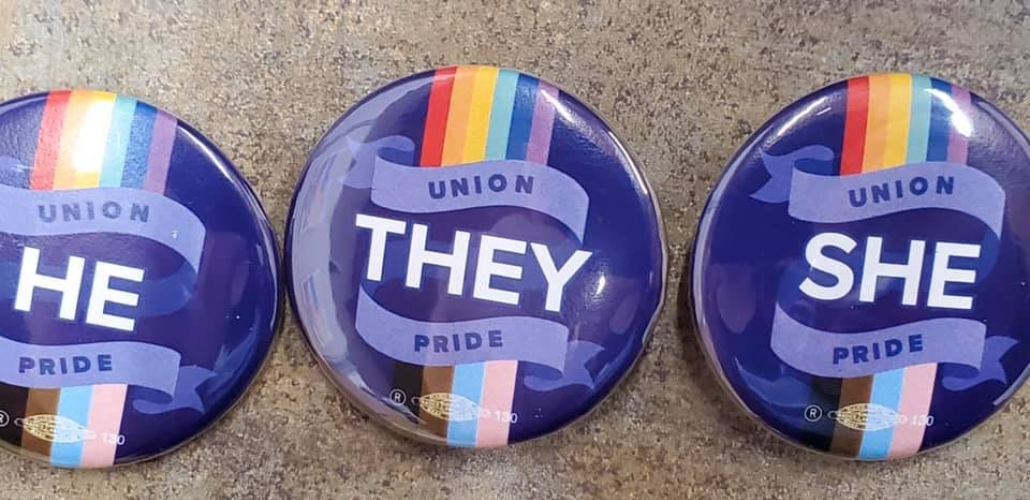Visible Support: Union Pride Pronoun Buttons

In one grocery store, the shop steward got nearly everyone wearing the button, which has a dual purpose: showing support for the union, and allowing members to express themselves genuinely at work. Photo: UFCW Local 555
In my union, UFCW Local 555, we found a straightforward yet powerful tool to make the workplace more inclusive: union pride pronoun buttons.
When I was still working in the deli, my trans co-worker (I wasn’t out at the time) was constantly misgendered—disrespectfully referred to as “she” by people who should know better. It was awful to see the way management talked about them behind their back. As I transitioned into the role of shop steward and later union staff member, I felt we needed to do something, anything to change the culture.
I introduced the idea of pronoun buttons. Framing the pronouns (he, she, or they) with the phrase “Union Pride” would ensure that labor laws protected members’ right to wear them at work. Plus, this would give the buttons a dual purpose: showing support for the union, and allowing members to express themselves genuinely at work.
Our graphic designer created the buttons, and shop stewards began distributing hundreds of them across various workplaces: retail, health care, food processing, and manufacturing.
The feedback was overwhelmingly positive. “As a transgender employee of nine years, thank you,” one person wrote online. “Thank you for including and respecting people like me.”

SUPPORT LABOR NOTES
BECOME A MONTHLY DONOR
Give $10 a month or more and get our "Fight the Boss, Build the Union" T-shirt.
Many cisgender co-workers wore the buttons in solidarity. In one grocery store, despite resistance from H.R., the shop steward got almost everyone wearing them.
A few people were dismissive or antagonistic, like the person who wrote on social media, “You don't need a button. You need to humble yourself.” But overall, the buttons promoted visibility and respect, and ignited crucial conversations about gender inclusivity.
For me, as a nonbinary person who often presents as more feminine, I often feel “at fault” if someone misgenders me. Wearing the button not only seems to help reduce the misgendering, but also reminds me that it is not on me, it’s on them.
I’m proud of our progress. UFCW’s international LGBTQ constituency group adopted the concept for nationwide use.
Sam Hughes is a former member and staffer of UFCW Local 555. The views and experiences shared in this article are personal to the author and do not disclose any confidential or proprietary information of UFCW Local 555.




